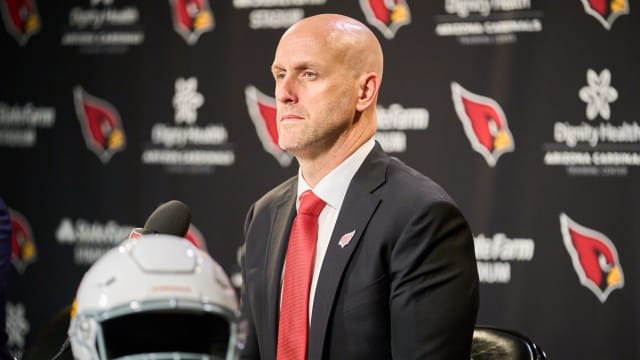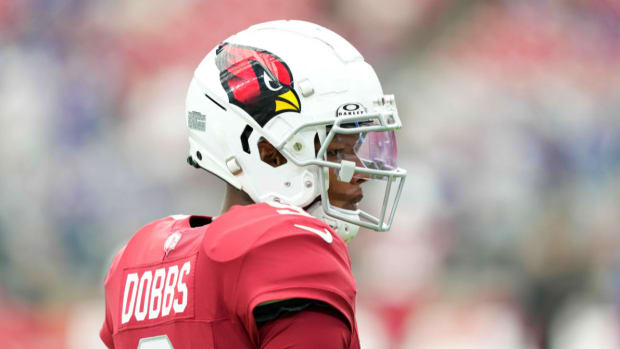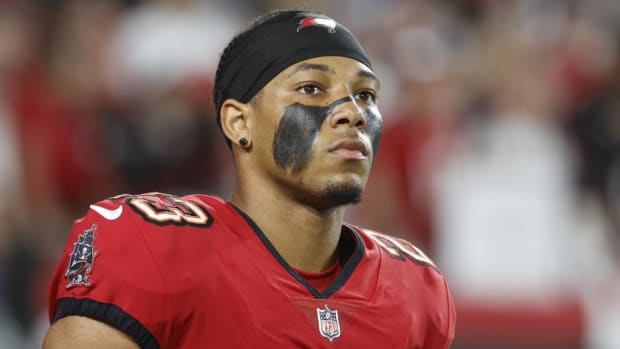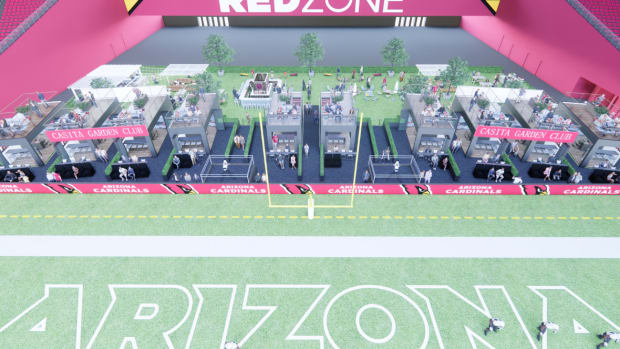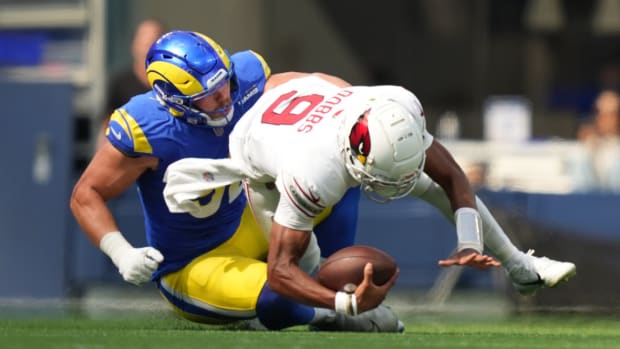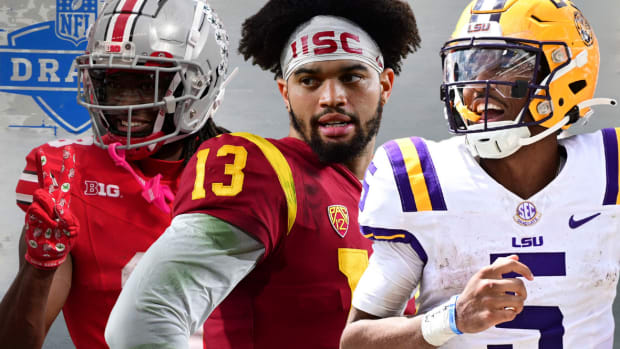Pros, Cons to Cardinals' Second Wave of Signings
ARIZONA -- The Arizona Cardinals have had an eventful free agency period thus far. While there haven't been any huge splash signings as of yet, GM Monti Ossenfort has certainly not shied away from opening the checkbook to bring in a variety of players to help fill the assortment of holes on Arizona's roster.
While I graded the first wave of Free Agent signings, these moves are a little more nuanced, so below is a breakdown of the pros and cons of each signing and trade acquisition since day one of free agency ended:
RB Deejay Dallas: 3 years, $8.4 million, $2.4 million guaranteed
Pros: Dallas is primarily a return specialist. This signing is more of a good sign for what Greg Dortch's role will be than anything else. At 5-foot-10, 215 pounds, Dallas is a bowling ball that can serve a solid purpose on special teams, while opening up Dortch's probability to be the starting slot receiver.
He offers an occasional change of pace on offense, and could be used in a pinch in short-yardage power situations or some third-down passing/blocking scenarios, and the contract offers very little guaranteed money, so it's not a huge risk signing. At worst he's RB depth with a solid role on special teams, at best he finds a home in the offense and becomes a cheap change of pace option and replaces Emari Demercado on the depth chart.
Cons: This is a bit of a one-dimensional signing by Ossenfort. Dallas has never marked more than 35 rushing attempts in a season, and while he has been a solid special teamer, he rushed a career-low 10 times with Seattle last season. He's young, so the potential for a breakout is there, and thankfully this isn't a large deal. Overall, I don't think this is a terrible signing, just not an entirely necessary one unless we see Dortch taken completely out of special teams duties.
OT Jonah Williams: 2 years, $30 million, $19 million guaranteed
Pros: This has the potential to be Ossenfort's best signing of the off-season. With the release of veteran LT D.J, Humphries, the Cardinals needed a younger, more cost-effective tackle without injury concerns, and they got that in Williams.
The former Bengal is 26, with a 6-foot-5 frame. He's only missed 2 games in the last three seasons, and has plenty of versatility on the line. Since the Cardinals haven't made a decision on where to slot Paris Johnson Jr. in 2024, a guy who's played plenty of snaps at both RT and LT (and even some at guard), is a great addition to the line.
Williams chose the Cardinals, and only spending just under $10 million a year for a premium position is a big upgrade from the cap hit Humphries would've had, even if he was healthy.
He's young, with upside, durability and versatility. While the Cardinals could (and should) still grab a tackle somewhere in the draft, his presence won't force them to expect starting LT play from a late first-round or later rookie. A perfect blend of traits for a Gannon-led team.
Cons: Williams has given up a lot of sacks. He's allowed eight or more each of the last three seasons, and 12 in 2022. While PFF grades aren't to live or die by, they aren't exactly high for the young tackle, and he does appear to have a bit of a penalty issue. While part of these issues could be helped along by the overall poor play of the Bengals' O-line, there are definite red flags in Williams' play as a whole. Spending a potential $30 million on someone who could end up being more of a hindrance than a help is a bit risky, although there is definite upside potential.
QB Desmond Ridder (Trade): 2 years, $2.6 million left on contract
Pros: Clayton Tune clearly wasn't ready last season, even in a backup role. Rather than going out and spending $10 million on a Darnold or Brissett, the Cards sent WR Rondale Moore to the Falcons in exchange for Atlanta's former starting QB. Ridder is on a rookie deal, and had an excellent career at the university of Cincinnati. He's started 17 games, but will be quite cheap and provide competition for Tune, hopefully leading to the betterment of both QBs.
Ridder's raw talent as a QB is high, and he would provide a little more poise and athleticism if Kyler Murray were to go down, and for just over $1.1 million for the next two years, it's good value for an era of football where backup QBs are growing ever closer to a premium position.
Cons: I just don't like the move in general. Sure, Moore wasn't going to be worth a lot, and this move nets a return as opposed to an outright release, but it feels hard to imagine Ossenfort being unable to grab even a 7th-round pick. Frankly, I'd rather have kept Moore than trade him for a backup QB who has serious struggles, but that statement could end up coming back to bite me if Murray misses significant time. As an isolated player, Ridder is a solid fit for the QB room, but it feels like Ossenfort could have played up some of Moore's flashes to a better return.
WR Chris Moore: 1 year, unknown salary
Pros: Moore is a 6-foot-1, 200-pound veteran receiver. He fits the archetype of the Cardinals receiver that Jonathan Gannon and Ossenfort want, with a big body and physicality. He's had double-digit yards per reception in five of his eight seasons, and most recently posted an astonishing 19.3 yards per reception in 2023. He's played in a vast majority of games since 2021, and has solid special teams ability. He provides depth to the receiving corp that severely lacked it, with some legitimate big-play potential. Assumedly, the contract is likely to be a team-friendly one, but the number has not been reported as of yet.
Cons: Moore has never been a significant factor on any offense. He has under 1,000 yards in his last two seasons combined, and outside those seasons, he'd never eclipsed 250 yards in a season. On top of the fact that he'll be 31 to start 2024, he might not have much of an impact on the offense. He has 8 touchdowns in 8 seasons, and while yardage and total touchdowns aren't the only things that matter for a receiver, he's likely no more than depth. Overall, it's not a bad signing, but it won't come close to moving the needle for Arizona.
DT Khyiris Tonga: 2 years, unknown salary
Pros: More serious beef for the D-line. Tonga is a whopping 6-foot-4, 338 pounds. A rotational defensive line needs plenty of depth, and Tonga provides an absolute wall of humanity in run-stopping situations. But he's not just mass, as he's graded out quite well as a pass rusher in his three seasons. Tonga is 27, and he's got nothing but upside. Judging by the reaction of Vikings fans on twitter to his signing, he was a bit of a fan favorite in Minnesota who deserved a chance to get more playing time. At worst he's an imposing rotational presence on the line, at best he helps fill the massive run-stopping hole in the Cardinals' front seven.
Cons: Tonga's production is very limited. Sure, raw numbers aren't everything, but he only has 67 total tackles and three TFLs in his three-year career. He's also missed 12 games since 2021, and has only started 6 games in his career. Again, this move is very low risk, and he fits the physical, bully-ball archetype that Ossenfort and Gannon want, but there isn't a lot of flash to this signing, and he could very well not be much of an upgrade over last year's D-line, although that is difficult to imagine.
The Cardinals have plenty of off-season left to go, but so far Ossenfort has done exactly what this writer predicted: add plenty of depth, with upside on affordable contracts, keeping the median age low and making sure these are players who aren't inclined to spend half the season on IR. Since "anything is an upgrade" for a few positions on this team, it's hard to imagine any of these signings being legitimately terrible in the long run, and there hasn't been a huge payday for anyone thus far.
The real test will come in the draft.

